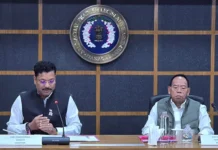[ Junroi Mamai ]
ITANAGAR, Apr 25: The recent directive of the education department to the higher and technical education institutes to resume teaching using online and e-learning methodologies to avoid academic loss for students in the wake of the nationwide lockdown has put immense pressure on teachers and students alike.
Following the directive issued on 13 April, all higher and technical education institutes of the state complied, and many teachers have already started conducting online classes.
However, in a state where internet connectivity has remained an issue for decades, many are questioning the feasibility and efficacy of the directive. While online classes have become a norm in most parts of the country, the same cannot be said for Arunachal, where good internet service is limited to a few urban areas, unlike in the metros.
Education Secretary Niharika Rai has also acknowledged that many students cannot be reached because they are back in their villages or are facing network issues.
The secretary informed that she has asked the higher education directorate to ensure that college lecturers record their classes and, if needed, supply the recordings to the students at a later date.
“We are trying our best by whatever means available to colleges. Places where internet service is available even for a short period, we are planning to supply reprographic materials to students in those areas.
“It’s an unprecedented situation, and we are trying our best that materials and notes along with online classes are arranged for students,” Rai said.
Meanwhile, many college and university students and lecturers have expressed concern over the issue as most of them are finding it difficult to maintain the academic schedule of online teaching during the lockdown.
Speaking to this daily, a lecturer who teaches at a government college informed that all of her colleagues have started conducting classes using Google Classroom, WhatsApp, or the Zoom app.
“Since there are no facilities available for conducting online classes at the institution, we have to rely on Google Classroom, WhatsApp and Zoom app. We are trying to reach out to students individually via these mediums. However, some of my students told me that they have to walk 15-20 kms to reach network zones in order to access the internet, while there are some who do not own smartphones,” she said.
She said that the teaching and learning process in these circumstances are nothing short of a challenge.
“Students are always in doubt, and the fact that there is no direct interaction with them makes it even more difficult for us because we have to repeat things again and again for them.
“These mediums of teaching may be good for smaller classes having 40 to 50 students, but for larger classes like mine, which has 136 students, it is clearly not effective. It is impossible to disseminate all of the information to each and every one of the students at the same time,” she added.
Many students who are currently attending online classes say that internet connectivity is the biggest issue hampering their studies. They also agree that online teaching is more about providing them with notes than being actual, interactive classes.
“We can’t access the internet properly even in the capital. How can the university or colleges, except those in the district headquarters, have uninterrupted internet access? They are also taking attendance at times but (there is) no point in that as well, because, again, no one will be online at the same time. What is the guarantee that the one who’s giving attendance online would have attended classes in person?” said a university student.
In the meantime, various colleges and universities are awaiting directions from the University Grants Commission (UGC) to chalk out a plan of action regarding conducting examinations and preparing an academic calendar.
The UGC had earlier constituted an expert committee to discuss the issues related to examinations and academic calendar. It was expected to submit its report by 13 April. It is yet to do so.
Now students are anxious over sitting for their examinations as some universities and colleges have hinted at conducting exams immediately after the lockdown period is over.


